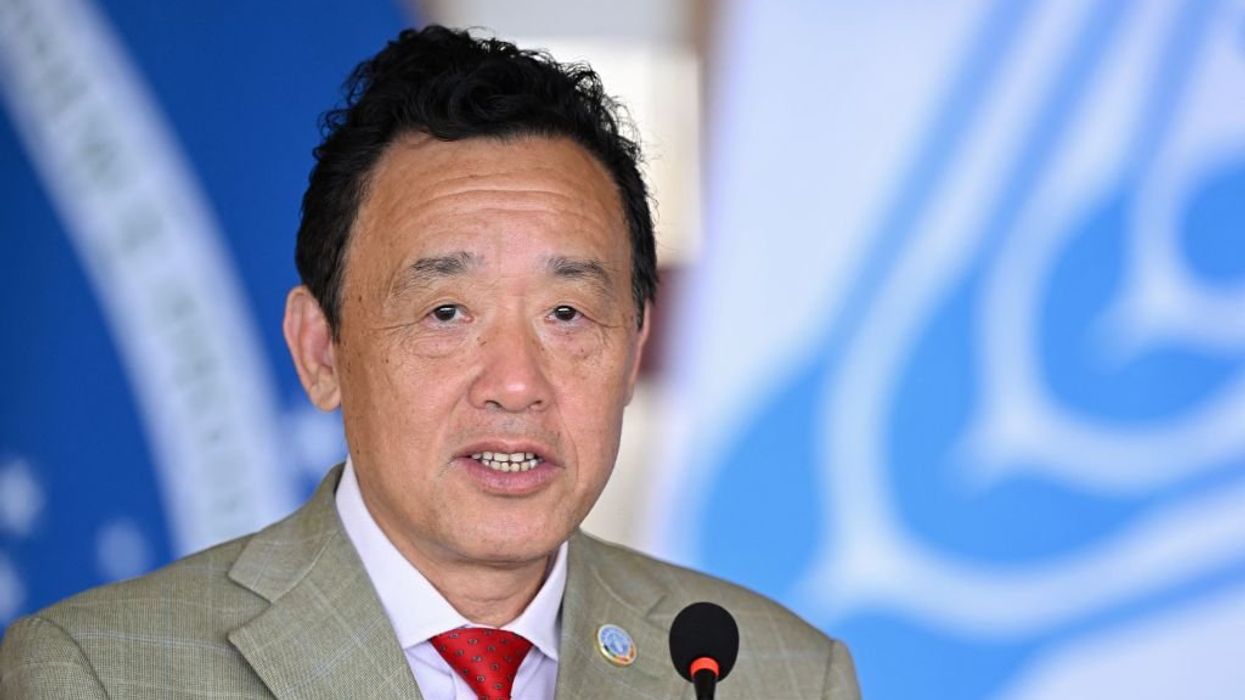
Photo by EVARISTO SA/AFP via Getty Images

The United Nations wants Americans and other Westerners to eat less meat. Although the alleged purpose of the internationally requested diet is to futilely attempt to arrest global weather patterns, there appears to be more at play than just so-called distributive justice and climate alarmism.
After all, the director-general of the specific U.N. agency expected to issue this demand during the COP28 summit next month happens to be a top Chinese Communist Party member whose nation, the number-one source of greenhouse gas emissions in the world, will likely be among the so-called developing nations exempted from the guidance.
Last November, the U.N. Food and Agriculture Organization indicated it would develop a plan to make the world's food system more sustainable, telling sovereign nations how to change their respective food and farming industries in order to align with internationalists' goal of halting global weather patterns and somehow keeping warming at 1.5 degrees Celsius.
Bloomberg reported that the FAO's guidelines, set to be published at the COP28 summit in December, will instruct developed nations whose populations allegedly consume too much meat — according to foreign metrics — to limit their intake.
According the FAO, the average American reportedly consumes around 279 pounds of meat a year. By way of contrast, the average Nigerian reportedly eats 15 pounds of meat annually and the average Chinese resident consumes 133.6 pounds of meat, as of 2020.
Under the guidance, developing countries, including the country with the world's second-biggest economy, will apparently be encouraged to improve their livestock farming.
Not only does the forthcoming recommendation seem to be punitive for Western nations, it may also be counterproductive.
House Agriculture Committee Chairman Glenn Thompson (R-Pa.) told Fox News Digital, "Regulating producers out of business in the U.S. will not effectively address global climate change, but export production to foreign countries with hostile regimes and worse emissions profiles while harming food security and affordability. Simply put, the world needs American farmers and ranchers more than the U.N."
China, which has all but indicated it will not live up to its Paris climate accord commitments, continues to claim it is a developing country.
Chinese dictator Xi Jinping's nominal second in command, Han Zheng, claimed at the U.N. general assembly in September that despite its $18 trillion GDP at the time, China is "the largest developing country" and "will remain a member of the big family of developing nations."
While it's presently unclear whether this self-categorization alone — which the U.N. entertains despite American criticism — would exempt China from the dietary recommendation, the director general of the FAO is unlikely to cross Beijing with his agency's road map.
Qu Dongyu has previously been accused of using his position to advance the merciless Chinese regime's foreign policy agenda. Beijing has also been accused of bribing officials to get Qu the gig.
Qu formerly served as vice minister of agriculture and rural affairs for the CCP. As FAO director, he has continued to cheerlead Chinese initiatives such as the communist regime's Global Development Initiative.
"Nobody actually takes him seriously: It's not him; it's China," a former U.N. official told Politico. "I'm not convinced he would make a single decision without first checking it with the capital."
Concerning Qu's promotion of the U.N.'s so-called sustainable development goals, Francesca Ghiretti, an analyst at the Mercator Institute for China Studies, said, "You need to be aware that these are policies that first and foremost are thought to advance China, either materially or in terms of international reputation, or in terms of diplomacy."
The Washington Free Beacon reported that a reduction in global meat production could greatly benefit China, which is the world's largest meat importer. China's foreign supply could conceivably become more stable and secure if American producers find themselves facing less domestic demand. Such security would undoubtedly be welcome after last year's large-scale food shortages and the regime's promise of material improvement in living year over year.
Concerning Qu's 2019 election to head of the FAO, Kristine Lee of the Center for a New American Security told Foreign Policy, "Chinese officials report back to Beijing and first and foremost serve the narrow interests of the [Chinese Communist Party], rather than truly advancing multilateralism and strengthening transparency and accountability at the U.N."
Like Blaze News? Bypass the censors, sign up for our newsletters, and get stories like this direct to your inbox. Sign up here!